Compare and Contrast: Travel Habits of GX and Millennials in Australia
VerifiedAdded on 2022/09/26
|5
|1428
|23
Literature Review
AI Summary
This literature review examines the travel habits and preferences of Generation X (GX) and Millennials in Australia during the 21st century. It explores the influence of socio-economic, socio-cultural, and socio-technical factors on their travel behaviors. The review analyzes various studies that compare and contrast the travel patterns of these two generations, considering factors such as income, social media influence, and family culture. The research highlights that while there are differences, such as Millennials taking more trips and relying on social media, there are also similarities in their travel motivations, particularly in the context of Australia's cultural background. The review uses a comparative descriptive analysis to assess the changing attitudes of these generations, with the aim of providing insights into future travel trends and the implications for the tourism industry. The limitations of the study are also discussed, including the small sample size and geographic focus.
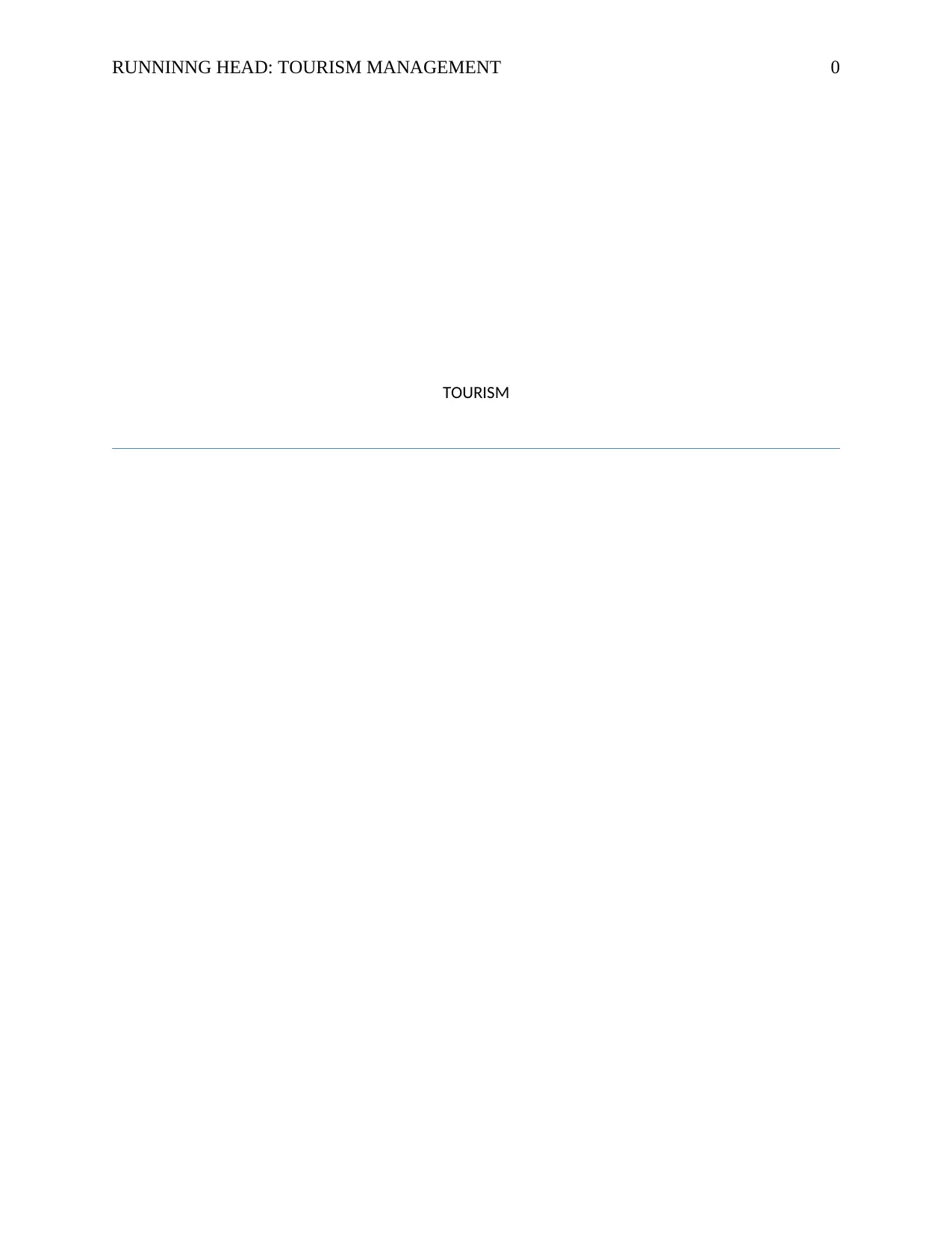
RUNNINNG HEAD: TOURISM MANAGEMENT 0
TOURISM
TOURISM
Paraphrase This Document
Need a fresh take? Get an instant paraphrase of this document with our AI Paraphraser
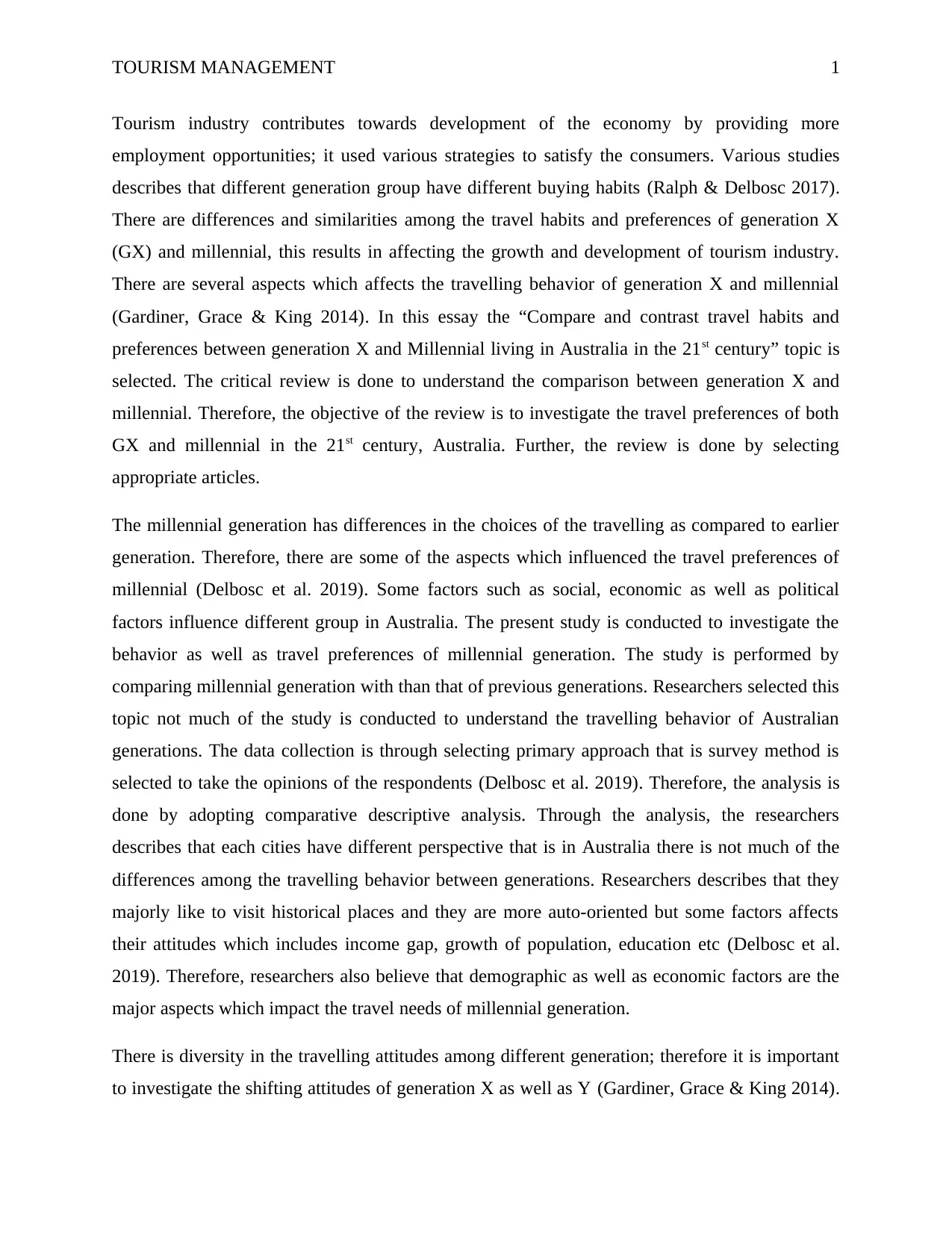
TOURISM MANAGEMENT 1
Tourism industry contributes towards development of the economy by providing more
employment opportunities; it used various strategies to satisfy the consumers. Various studies
describes that different generation group have different buying habits (Ralph & Delbosc 2017).
There are differences and similarities among the travel habits and preferences of generation X
(GX) and millennial, this results in affecting the growth and development of tourism industry.
There are several aspects which affects the travelling behavior of generation X and millennial
(Gardiner, Grace & King 2014). In this essay the “Compare and contrast travel habits and
preferences between generation X and Millennial living in Australia in the 21st century” topic is
selected. The critical review is done to understand the comparison between generation X and
millennial. Therefore, the objective of the review is to investigate the travel preferences of both
GX and millennial in the 21st century, Australia. Further, the review is done by selecting
appropriate articles.
The millennial generation has differences in the choices of the travelling as compared to earlier
generation. Therefore, there are some of the aspects which influenced the travel preferences of
millennial (Delbosc et al. 2019). Some factors such as social, economic as well as political
factors influence different group in Australia. The present study is conducted to investigate the
behavior as well as travel preferences of millennial generation. The study is performed by
comparing millennial generation with than that of previous generations. Researchers selected this
topic not much of the study is conducted to understand the travelling behavior of Australian
generations. The data collection is through selecting primary approach that is survey method is
selected to take the opinions of the respondents (Delbosc et al. 2019). Therefore, the analysis is
done by adopting comparative descriptive analysis. Through the analysis, the researchers
describes that each cities have different perspective that is in Australia there is not much of the
differences among the travelling behavior between generations. Researchers describes that they
majorly like to visit historical places and they are more auto-oriented but some factors affects
their attitudes which includes income gap, growth of population, education etc (Delbosc et al.
2019). Therefore, researchers also believe that demographic as well as economic factors are the
major aspects which impact the travel needs of millennial generation.
There is diversity in the travelling attitudes among different generation; therefore it is important
to investigate the shifting attitudes of generation X as well as Y (Gardiner, Grace & King 2014).
Tourism industry contributes towards development of the economy by providing more
employment opportunities; it used various strategies to satisfy the consumers. Various studies
describes that different generation group have different buying habits (Ralph & Delbosc 2017).
There are differences and similarities among the travel habits and preferences of generation X
(GX) and millennial, this results in affecting the growth and development of tourism industry.
There are several aspects which affects the travelling behavior of generation X and millennial
(Gardiner, Grace & King 2014). In this essay the “Compare and contrast travel habits and
preferences between generation X and Millennial living in Australia in the 21st century” topic is
selected. The critical review is done to understand the comparison between generation X and
millennial. Therefore, the objective of the review is to investigate the travel preferences of both
GX and millennial in the 21st century, Australia. Further, the review is done by selecting
appropriate articles.
The millennial generation has differences in the choices of the travelling as compared to earlier
generation. Therefore, there are some of the aspects which influenced the travel preferences of
millennial (Delbosc et al. 2019). Some factors such as social, economic as well as political
factors influence different group in Australia. The present study is conducted to investigate the
behavior as well as travel preferences of millennial generation. The study is performed by
comparing millennial generation with than that of previous generations. Researchers selected this
topic not much of the study is conducted to understand the travelling behavior of Australian
generations. The data collection is through selecting primary approach that is survey method is
selected to take the opinions of the respondents (Delbosc et al. 2019). Therefore, the analysis is
done by adopting comparative descriptive analysis. Through the analysis, the researchers
describes that each cities have different perspective that is in Australia there is not much of the
differences among the travelling behavior between generations. Researchers describes that they
majorly like to visit historical places and they are more auto-oriented but some factors affects
their attitudes which includes income gap, growth of population, education etc (Delbosc et al.
2019). Therefore, researchers also believe that demographic as well as economic factors are the
major aspects which impact the travel needs of millennial generation.
There is diversity in the travelling attitudes among different generation; therefore it is important
to investigate the shifting attitudes of generation X as well as Y (Gardiner, Grace & King 2014).
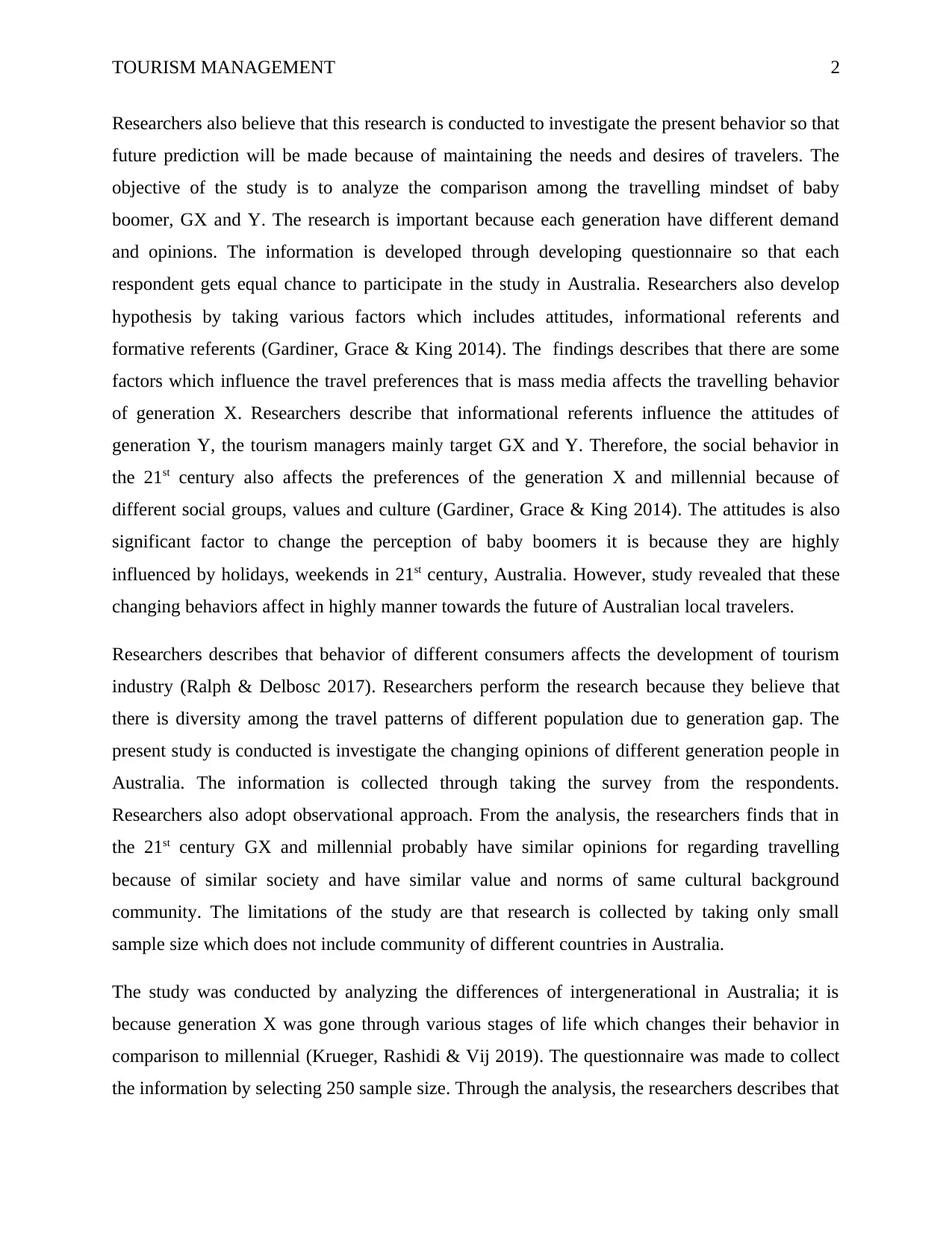
TOURISM MANAGEMENT 2
Researchers also believe that this research is conducted to investigate the present behavior so that
future prediction will be made because of maintaining the needs and desires of travelers. The
objective of the study is to analyze the comparison among the travelling mindset of baby
boomer, GX and Y. The research is important because each generation have different demand
and opinions. The information is developed through developing questionnaire so that each
respondent gets equal chance to participate in the study in Australia. Researchers also develop
hypothesis by taking various factors which includes attitudes, informational referents and
formative referents (Gardiner, Grace & King 2014). The findings describes that there are some
factors which influence the travel preferences that is mass media affects the travelling behavior
of generation X. Researchers describe that informational referents influence the attitudes of
generation Y, the tourism managers mainly target GX and Y. Therefore, the social behavior in
the 21st century also affects the preferences of the generation X and millennial because of
different social groups, values and culture (Gardiner, Grace & King 2014). The attitudes is also
significant factor to change the perception of baby boomers it is because they are highly
influenced by holidays, weekends in 21st century, Australia. However, study revealed that these
changing behaviors affect in highly manner towards the future of Australian local travelers.
Researchers describes that behavior of different consumers affects the development of tourism
industry (Ralph & Delbosc 2017). Researchers perform the research because they believe that
there is diversity among the travel patterns of different population due to generation gap. The
present study is conducted is investigate the changing opinions of different generation people in
Australia. The information is collected through taking the survey from the respondents.
Researchers also adopt observational approach. From the analysis, the researchers finds that in
the 21st century GX and millennial probably have similar opinions for regarding travelling
because of similar society and have similar value and norms of same cultural background
community. The limitations of the study are that research is collected by taking only small
sample size which does not include community of different countries in Australia.
The study was conducted by analyzing the differences of intergenerational in Australia; it is
because generation X was gone through various stages of life which changes their behavior in
comparison to millennial (Krueger, Rashidi & Vij 2019). The questionnaire was made to collect
the information by selecting 250 sample size. Through the analysis, the researchers describes that
Researchers also believe that this research is conducted to investigate the present behavior so that
future prediction will be made because of maintaining the needs and desires of travelers. The
objective of the study is to analyze the comparison among the travelling mindset of baby
boomer, GX and Y. The research is important because each generation have different demand
and opinions. The information is developed through developing questionnaire so that each
respondent gets equal chance to participate in the study in Australia. Researchers also develop
hypothesis by taking various factors which includes attitudes, informational referents and
formative referents (Gardiner, Grace & King 2014). The findings describes that there are some
factors which influence the travel preferences that is mass media affects the travelling behavior
of generation X. Researchers describe that informational referents influence the attitudes of
generation Y, the tourism managers mainly target GX and Y. Therefore, the social behavior in
the 21st century also affects the preferences of the generation X and millennial because of
different social groups, values and culture (Gardiner, Grace & King 2014). The attitudes is also
significant factor to change the perception of baby boomers it is because they are highly
influenced by holidays, weekends in 21st century, Australia. However, study revealed that these
changing behaviors affect in highly manner towards the future of Australian local travelers.
Researchers describes that behavior of different consumers affects the development of tourism
industry (Ralph & Delbosc 2017). Researchers perform the research because they believe that
there is diversity among the travel patterns of different population due to generation gap. The
present study is conducted is investigate the changing opinions of different generation people in
Australia. The information is collected through taking the survey from the respondents.
Researchers also adopt observational approach. From the analysis, the researchers finds that in
the 21st century GX and millennial probably have similar opinions for regarding travelling
because of similar society and have similar value and norms of same cultural background
community. The limitations of the study are that research is collected by taking only small
sample size which does not include community of different countries in Australia.
The study was conducted by analyzing the differences of intergenerational in Australia; it is
because generation X was gone through various stages of life which changes their behavior in
comparison to millennial (Krueger, Rashidi & Vij 2019). The questionnaire was made to collect
the information by selecting 250 sample size. Through the analysis, the researchers describes that
⊘ This is a preview!⊘
Do you want full access?
Subscribe today to unlock all pages.

Trusted by 1+ million students worldwide
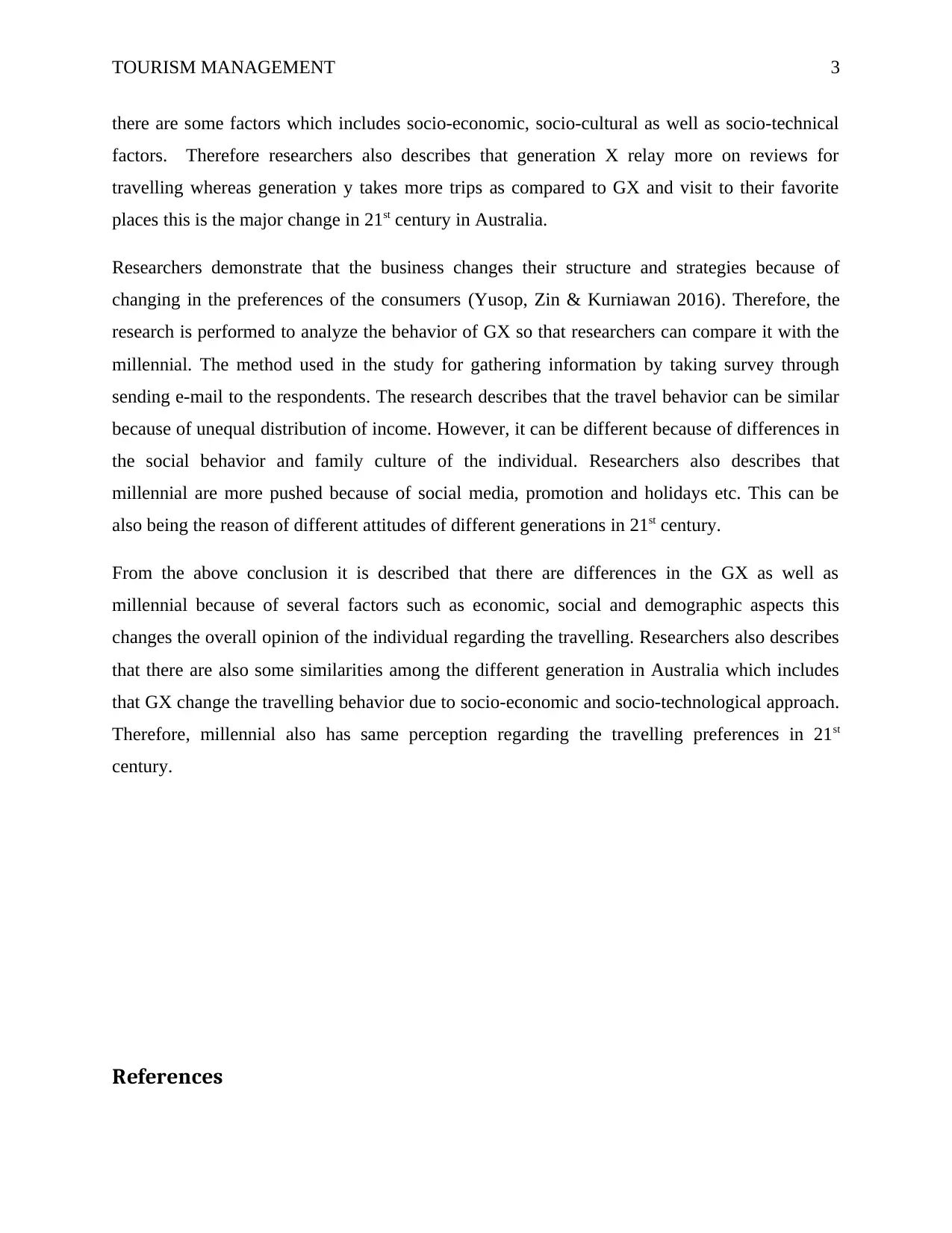
TOURISM MANAGEMENT 3
there are some factors which includes socio-economic, socio-cultural as well as socio-technical
factors. Therefore researchers also describes that generation X relay more on reviews for
travelling whereas generation y takes more trips as compared to GX and visit to their favorite
places this is the major change in 21st century in Australia.
Researchers demonstrate that the business changes their structure and strategies because of
changing in the preferences of the consumers (Yusop, Zin & Kurniawan 2016). Therefore, the
research is performed to analyze the behavior of GX so that researchers can compare it with the
millennial. The method used in the study for gathering information by taking survey through
sending e-mail to the respondents. The research describes that the travel behavior can be similar
because of unequal distribution of income. However, it can be different because of differences in
the social behavior and family culture of the individual. Researchers also describes that
millennial are more pushed because of social media, promotion and holidays etc. This can be
also being the reason of different attitudes of different generations in 21st century.
From the above conclusion it is described that there are differences in the GX as well as
millennial because of several factors such as economic, social and demographic aspects this
changes the overall opinion of the individual regarding the travelling. Researchers also describes
that there are also some similarities among the different generation in Australia which includes
that GX change the travelling behavior due to socio-economic and socio-technological approach.
Therefore, millennial also has same perception regarding the travelling preferences in 21st
century.
References
there are some factors which includes socio-economic, socio-cultural as well as socio-technical
factors. Therefore researchers also describes that generation X relay more on reviews for
travelling whereas generation y takes more trips as compared to GX and visit to their favorite
places this is the major change in 21st century in Australia.
Researchers demonstrate that the business changes their structure and strategies because of
changing in the preferences of the consumers (Yusop, Zin & Kurniawan 2016). Therefore, the
research is performed to analyze the behavior of GX so that researchers can compare it with the
millennial. The method used in the study for gathering information by taking survey through
sending e-mail to the respondents. The research describes that the travel behavior can be similar
because of unequal distribution of income. However, it can be different because of differences in
the social behavior and family culture of the individual. Researchers also describes that
millennial are more pushed because of social media, promotion and holidays etc. This can be
also being the reason of different attitudes of different generations in 21st century.
From the above conclusion it is described that there are differences in the GX as well as
millennial because of several factors such as economic, social and demographic aspects this
changes the overall opinion of the individual regarding the travelling. Researchers also describes
that there are also some similarities among the different generation in Australia which includes
that GX change the travelling behavior due to socio-economic and socio-technological approach.
Therefore, millennial also has same perception regarding the travelling preferences in 21st
century.
References
Paraphrase This Document
Need a fresh take? Get an instant paraphrase of this document with our AI Paraphraser
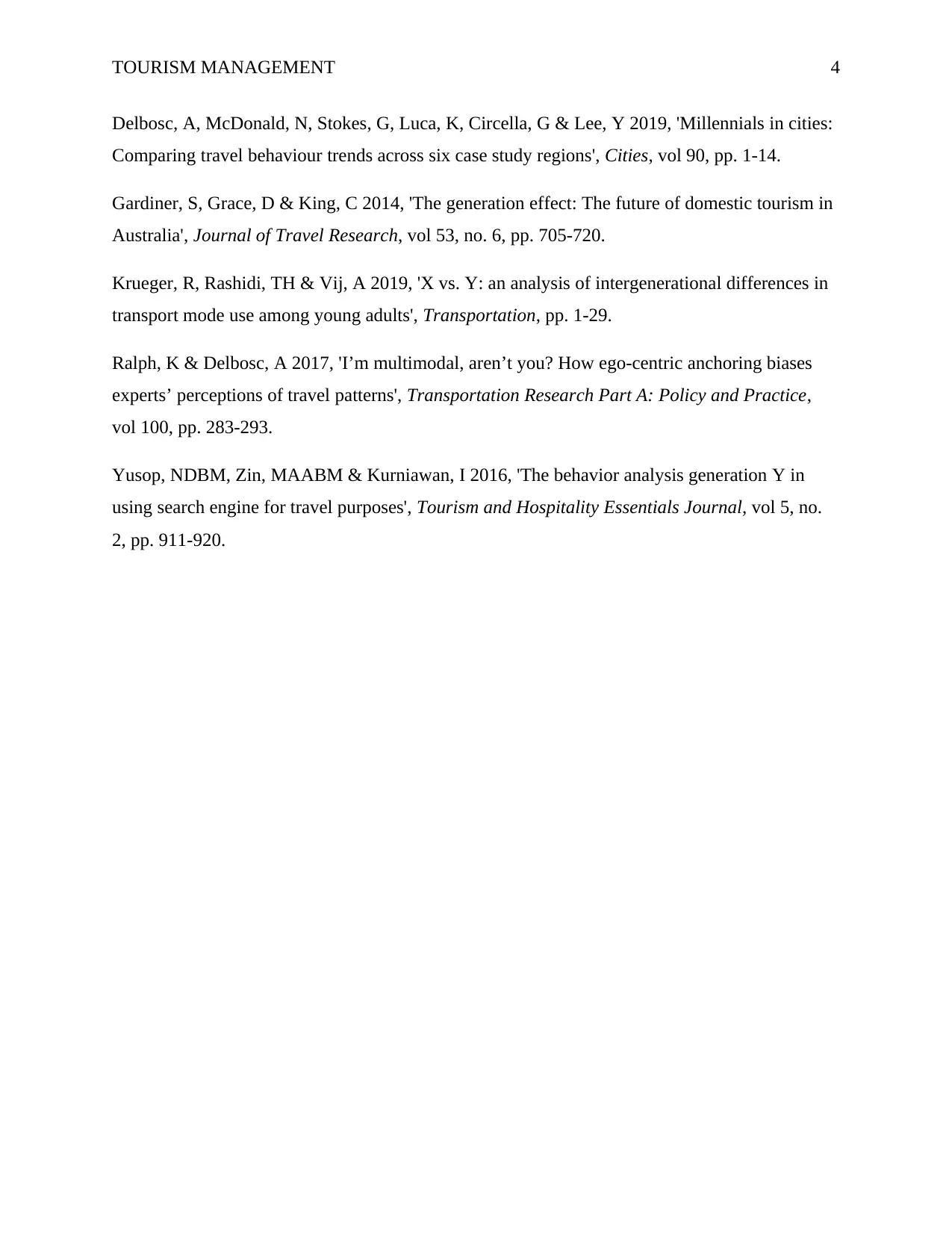
TOURISM MANAGEMENT 4
Delbosc, A, McDonald, N, Stokes, G, Luca, K, Circella, G & Lee, Y 2019, 'Millennials in cities:
Comparing travel behaviour trends across six case study regions', Cities, vol 90, pp. 1-14.
Gardiner, S, Grace, D & King, C 2014, 'The generation effect: The future of domestic tourism in
Australia', Journal of Travel Research, vol 53, no. 6, pp. 705-720.
Krueger, R, Rashidi, TH & Vij, A 2019, 'X vs. Y: an analysis of intergenerational differences in
transport mode use among young adults', Transportation, pp. 1-29.
Ralph, K & Delbosc, A 2017, 'I’m multimodal, aren’t you? How ego-centric anchoring biases
experts’ perceptions of travel patterns', Transportation Research Part A: Policy and Practice,
vol 100, pp. 283-293.
Yusop, NDBM, Zin, MAABM & Kurniawan, I 2016, 'The behavior analysis generation Y in
using search engine for travel purposes', Tourism and Hospitality Essentials Journal, vol 5, no.
2, pp. 911-920.
Delbosc, A, McDonald, N, Stokes, G, Luca, K, Circella, G & Lee, Y 2019, 'Millennials in cities:
Comparing travel behaviour trends across six case study regions', Cities, vol 90, pp. 1-14.
Gardiner, S, Grace, D & King, C 2014, 'The generation effect: The future of domestic tourism in
Australia', Journal of Travel Research, vol 53, no. 6, pp. 705-720.
Krueger, R, Rashidi, TH & Vij, A 2019, 'X vs. Y: an analysis of intergenerational differences in
transport mode use among young adults', Transportation, pp. 1-29.
Ralph, K & Delbosc, A 2017, 'I’m multimodal, aren’t you? How ego-centric anchoring biases
experts’ perceptions of travel patterns', Transportation Research Part A: Policy and Practice,
vol 100, pp. 283-293.
Yusop, NDBM, Zin, MAABM & Kurniawan, I 2016, 'The behavior analysis generation Y in
using search engine for travel purposes', Tourism and Hospitality Essentials Journal, vol 5, no.
2, pp. 911-920.
1 out of 5
Your All-in-One AI-Powered Toolkit for Academic Success.
+13062052269
info@desklib.com
Available 24*7 on WhatsApp / Email
![[object Object]](/_next/static/media/star-bottom.7253800d.svg)
Unlock your academic potential
Copyright © 2020–2026 A2Z Services. All Rights Reserved. Developed and managed by ZUCOL.
